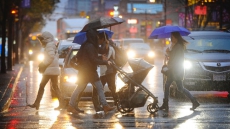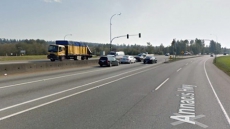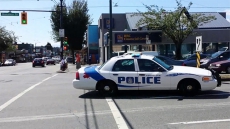VANCOUVER — Officials at British Columbia's public power utility have been raising concerns as early as 2009 that earthquakes caused by a controversial gas-extraction method used in the mining industry may put the province's largest hydroelectric dams at risk, internal documents reveal.
Emails obtained through an access-to-information request by the Canadian Centre for Policy Alternatives show BC Hydro discussing the possible threat posed by hydraulic fracturing, or fracking, a mining technique that involves injecting high-pressure fluid deep underground in order to extract either natural gas or coal-bed methane.
Critics have slammed fracking as a poorly understood and risky industrial activity that contributes to increased seismic activity and risks contaminating nearby aquifers.
In one BC Hydro email exchange dated Dec. 3, 2009, safety officer Ray Stewart expresses his unease to water rights comptroller Glen Davidson over the risks of a particular methane-extraction project near the Peace Canyon Dam.
"This letter is to inform you of BC Hydro's concern," Stewart writes.
"BC Hydro believes that there are immediate and future potential risks to BC Hydro's reservoir, dam and power generation infrastructure as a result of this coal-bed methane project."
He provides a list of potential impacts, including seismic activity beyond what the dam can withstand and hydrogeologic effects on the reservoir.
Another email, dated March 17, 2013, from dam safety engineer Scott Gilliss to engineering scientist Desmond Hartford, discusses Gilliss' research connecting an increase in fracking to a jump in seismic activity.
"In my view, the province should simply add buffer zones around any very extreme and very high consequence dams, where hydraulic fracturing cannot be undertaken without a prior full investigation into the risks, and an implemented risk management plan," Gilliss writes.

"Why is this so difficult?"
The province experienced its largest fracking-related earthquake on record last summer, a magnitude 4.6 tremor that sparked further concerns about seismic activity linked to hydraulic fracturing.
In a emailed statement sent Monday, BC Hydro deputy executive Chris O'Riley said BC Hydro's dams are designed to withstand ground motions much larger and longer than those associated with fracking and that hydraulic fracturing activity has never taken place within five kilometres of the utility's dams.
"The BC Oil and Gas Commission has put restrictions in place so that no new tenures will be issued within five kilometres of BC Hydro's dams," O'Riley added
"The BC Oil and Gas Commission has also agreed to notify BC Hydro prior to any planned activity in any of the existing tenures so that BC Hydro can plan its operations and maintenance activities accordingly."
But Ben Parfitt, a resource policy analyst with the Canadian Centre for Policy Alternatives, said the understanding that Oil and Gas Commission will notify BC Hydro if existing tenure holders decide to carry out fracking activity is nothing more than a "gentleman's agreement."
"I find it disturbing that we have no firm regulation in place … that simply says clearly there are frack-free zones," Parfitt said in an interview.
"Government is there to regulate and to ensure public health and safety. The best way to do that is be clear about what industrial activities will be allowed where and what will not be allowed."
In an emailed statement, the province's Natural Gas Ministry said B.C. reports it has strong regulations that are continually reviewed and updated in response to new technology and studies to protect public safety and the environment.
"Industry requires the appropriate permits before any operation can move forward, and experts with the BC Oil and Gas Commission review all submissions," reads the statement.

"Environmental protection and public safety are important considerations during the review process."





